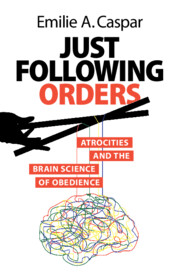Book contents
- Just Following Orders
- Just Following Orders
- Copyright page
- Contents
- Figures
- Preface
- Acknowledgments
- Introduction: Understanding Genocide as a Means to Prevention
- Chapter 1 Listening to the Perpetrators of Genocide
- Chapter 2 A Brief History of the Experimental Research on Obedience
- Chapter 3 How Do We Take Ownership over and Responsibility for Our Own Actions?
- Chapter 4 Moral Emotions under Obedience
- Chapter 5 Just Giving Orders? In the Brains of Those Who Command
- Chapter 6 Desolation Is Everywhere
- Chapter 7 Conclusion: How Ordinary People Stand Up against Immorality
- Epilogue: A Hopeful Horizon
- References
- Index
Chapter 4 - Moral Emotions under Obedience
Published online by Cambridge University Press: 25 July 2024
- Just Following Orders
- Just Following Orders
- Copyright page
- Contents
- Figures
- Preface
- Acknowledgments
- Introduction: Understanding Genocide as a Means to Prevention
- Chapter 1 Listening to the Perpetrators of Genocide
- Chapter 2 A Brief History of the Experimental Research on Obedience
- Chapter 3 How Do We Take Ownership over and Responsibility for Our Own Actions?
- Chapter 4 Moral Emotions under Obedience
- Chapter 5 Just Giving Orders? In the Brains of Those Who Command
- Chapter 6 Desolation Is Everywhere
- Chapter 7 Conclusion: How Ordinary People Stand Up against Immorality
- Epilogue: A Hopeful Horizon
- References
- Index
Summary
When we witness another person experiencing pain, be it emotional or physical, we have an empathic reaction. And even if we commit a harmful action against another person, we most of the time experience guilt in the aftermath, which prevents us from performing the same action in the future. Guilt and empathy are critical moral emotions that together usually prevent us from harming others. However, as this chapter shows, systematic processes of classification and dehumanization at play before a genocide can alter moral emotions towards another part of the population. Activity in empathy-related brain regions is generally reduced towards individuals that we consider as outgroup or towards dehumanized individuals. Neuroscience studies have further shown that when obeying orders to hurt another person, neural activity in empathy- and guilt-related brain regions is reduced compared to acting freely. Such results show how obeying orders diminishes our aversion to harming others.
- Type
- Chapter
- Information
- Just Following OrdersAtrocities and the Brain Science of Obedience, pp. 113 - 146Publisher: Cambridge University PressPrint publication year: 2024

